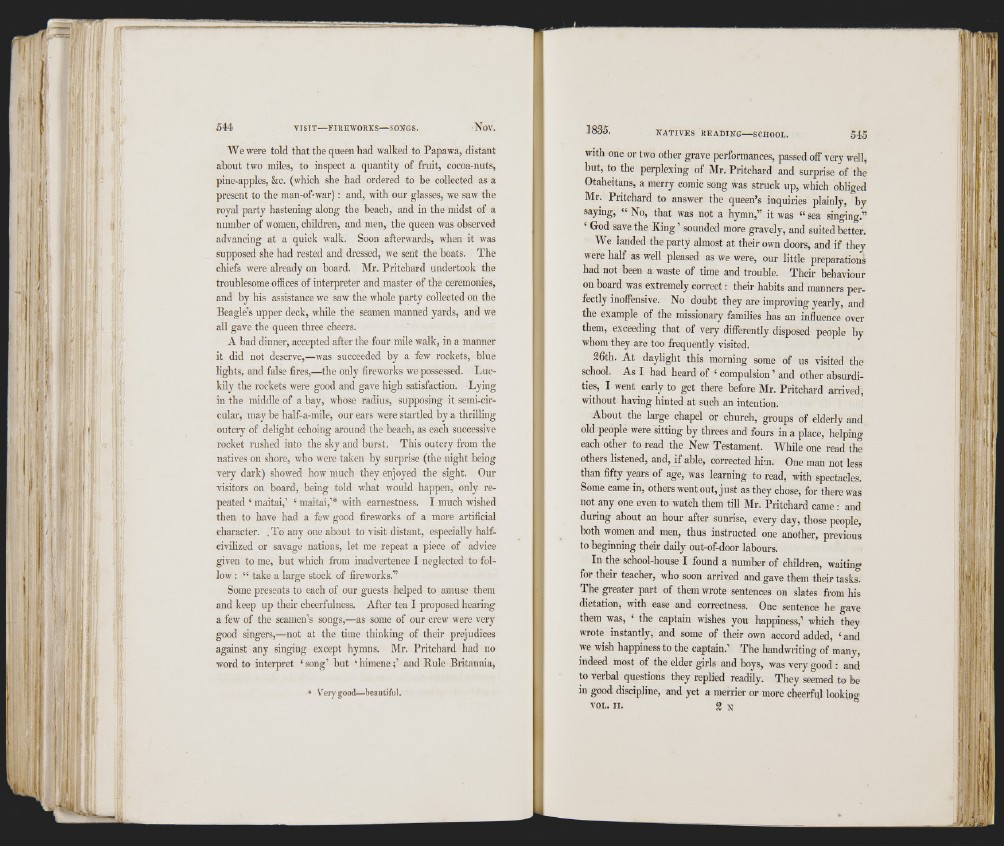
f l
.1 n
-V
' Ml
544 VISIT— FIREWORKS SONGS.
We were told that the queen had walked to Papawa, distant
ahout two miles, to inspect a quantity of fruit, cocoa-nuts,
pine-apples, &c. (which she had ordered to be collected as a
present to the man-of-war): and, with our glasses, we saw the
royal pai'ty hastening along the beach, and in the midst of a
number of women, children, and men, the queen was observed
advancing at a quick walk. Soon afterwards, when it was
supposed she had rested and dressed, we sent the hoats. The
chiefs were already on board. Mr, Pritchard undertook the
troublesome offices of interpreter and master of the ceremonies,
and by his assistance we saw the whole party collected on the
Beagle’s upper deck, while the seamen manned yards, and we
all gave the queen three cheers.
A bad dinner, accepted after the four mile walk, in a manner
it did not deserve,—was succeeded by a few rockets, blue
lights, and false fires,—the only fireworks we possessed. Luckily
the rockets were good and gave high satisfaction. Lying
in the middle of a bay, whose radius, supposing it semi-circular,
may be half-a-mile, our ears were startled by a thrilling
outcry of delight echoing around the beach, as each successive
rocket rushed into the sky and burst. This outcry from the
natives on shore, who were taken by surprise (the night being
very dark) showed how much they enjoyed the sight. Our
visitors on board, being told what would happen, only repeated
‘ maitai,’ ‘ maitai,’* with earnestness. I much wished
then to have had a few good fireworks of a more artificial
character. ,To any one about to visit distant, especially lialf-
civihzed or savage nations, let me repeat a piece of advice
given to me, but which from inadvertence I neglected to follow
: “ take a large stock of fireworks.”
Some presents to each of our guests helped to amuse them
and keep up their cheerfulness. After tea I proposed hearing
a few of the seamen’s songs,—as some of our crew were very
good singers,—not at the time thinking of their prejudices
against any singing except hymns. Mr. Pritchard had no
ivord to interpret ‘ song’ but ‘ himene;’ and Rule Britannia,
* Very good—beautiful.
With one or two other grave performances, passed off very well,
but, to the perplexing of Mr. Pritchard and surprise of the
Otaheitans, a merry comic song was struck up, which obliged
Mr. Pritchard to answer the queen’s inquiries plainly, by
saying, “ No, that was not a hymn,” it was “ sea singing.”
‘ God save the King ’ sounded more gravely, and suited better.
We landed the party almost at their own doors, and if they
were half as well pleased as we were, our little preparations
had not been a waste of time and trouble. Their behaviour
on board was extremely correct; their habits and manners perfectly
inoffensive. No doubt they are improving yearly, and
the example of the missionary families has an influence over
them, exceeding that of very differently disposed people by
whom they are too frequently visited.
26th. At daylight this morning some of us visited the
school. As I had heard of ‘ compulsion ’ and other absurdities,
I went early to get there before Mr. Pritchard arrived,
without having hinted at such an intention.
About the large chapel or church, groups of elderly and
old people were sitting by threes and fours in a place, helping
each other to read the New Testament. While one read the
others listened, and, if able, corrected him. One man not less
than fifty years of age, was learning to read, with spectacles.
Some came in, others went out, just as they chose, for there was
not any one even to watch them till Mr. Pritchard came : and
during ahout an hour after sunrise, every day, those people,
both women and men, thus instructed one another, previous
to beginning their daily out-of-door labours.
In the school-house I found a number of children, waiting
for their teacher, who soon arrived and gave them their tasks.
The greater part of them wrote sentences on slates from his
dictation, with ease and correctness. One sentence he gave
them was, ‘ the captain wishes you happiness,’ which they
wrote instantly, and some of their own accord added, ‘ and
we wish happiness to the captain.’ The handwriting of many,
indeed most of the elder girls and boys, was very good r and
to verbal questions they replied readily. They seemed to be
in good discipline, and yet a merrier or more cheerful looking
VOL. II . 2 N
¡I*-
l i